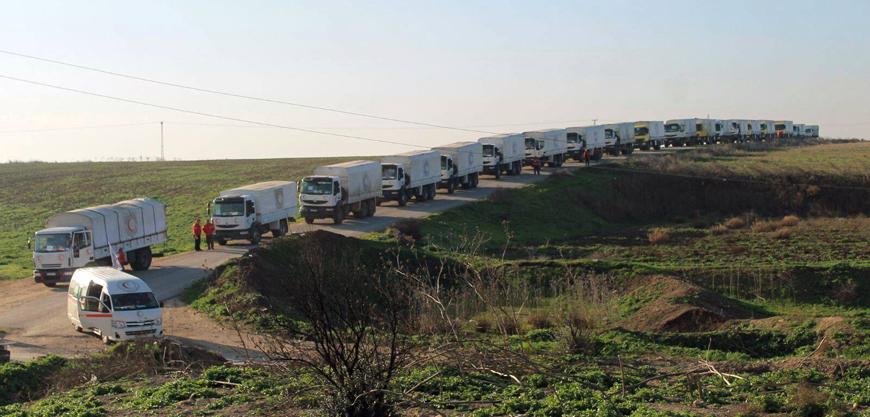You are here
Obama under fire for lack of leadership over Syria
By AFP - Feb 17,2016 - Last updated at Feb 17,2016

Aid trucks line a road before their departure for Damascus in this handout photo released on Wednesday (Reuters photo)
WASHINGTON — The United States is coming under increasingly bitter criticism for its perceived lack of leadership over Syria as the country's brutal civil conflict heads toward new levels of intensity.
Washington appears unable or unwilling to prevent its ally Turkey from bombing Kurdish fighters inside Syria, its critics say. And it has done little to rein in Russia's mounting military involvement on behalf of Bashar Assad.
President Barack Obama, at a summit in California, said "this is not a contest between me and Putin".
"The real question we should be asking is what is it that Russia thinks it gains if it gets a country that's been completely destroyed as an ally, that it now has to perpetually spend billions of dollars to prop up?" Obama said.
In the eyes of his detractors, Obama is guilty of refusing to engage in Syria by doing exactly what he said he would do when he was elected in 2008: pulling America out of Middle Eastern wars, after the Iraq debacle, and "pivot" US foreign policy towards Asia.
A pointed attack came Tuesday from France, where few have forgotten Obama's last-minute refusal to take action against Syria in 2013 after evidence surfaced that the government used chemical weapons against civilians.
"Obama had said, 'If he uses chemical weapons, it will cross a red line," former foreign minister Laurent Fabius said Tuesday on Europe 1 Radio. "And that red line was crossed with no reaction."
"When the history books are written, we'll see that this was a turning point, not only in the Middle East crisis but also for Ukraine, Crimea and the entire world," Fabius said earlier this month, adding that he regretted "ambiguities" and the "lack of very strong engagement" Washington has shown with respect to Syria.
After the bombing of hospitals and other civilian targets around the northern Syrian city of Aleppo on Monday, the State Department only bemoaned the "continued brutality of the Assad regime against its own people" and questioned Russia's "willingness" to put a stop to it.
For Jonathan Schanzer of the Foundation for Defense of Democracies in Washington, that simply wasn't enough.
"Historians will one day look back at our archives and wonder what we thought we'd accomplish with such statements," Schanzer tweeted Tuesday.
Republican Senator John McCain lashed out at the Obama administration's Syria choices.
"The intensification of Russian airstrikes in Syria over the past two days, including the bombing of schools and hospitals, is tragically unsurprising," McCain said.
"As expected, our adversaries in Syria are using that time to accelerate and conclude their siege on Aleppo... This is diplomacy in the service of military aggression, and unfortunately, the Obama administration is enabling it," he stressed.
The White House has dismissed the accusations of inaction.
Washington says the military coalition of 65 countries it has led for the past 18 months has carried out thousands of air strikes against Daesh militants, who control territory in both Syria and Iraq.
At the same time, Secretary of State John Kerry — a skeptic of military interventionism known for his boundless public optimism about the diplomatic process — has spearheaded an attempt to launch a peace process together with 20 global and regional powers.
The United States and Russia agreed in Munich on Friday on a "cessation of hostilities" in Syria within a week with the aim of relaunching the peace process and halting the exodus of civilians.
They also agreed to open humanitarian aid corridors.
But with Moscow intensifying its air campaign in northern Syria and Turkey stepping up calls for a ground offensive, any hope for a truce seems increasingly illusory.
'Moral bankruptcy'
Even Washington's critics understand it is in a very difficult position.
An ally of Ankara within NATO and the anti-terror coalition, it also supports Kurdish militia groups fighting Daesh in Syria.
The United States is also formally Russia's partner in the search for a political solution in Syria.
Kerry hashed out Friday's Munich agreement together with his Russian counterpart Sergei Lavrov.
However, few believe anything will come of it.
"One shouldn't expect anything from the Americans... They have no more credibility" in the Middle East, said Joseph Bahout, a scholar at the Carnegie Endowment who spoke on Thursday just before the agreement was announced.
And in a recent article from the Brookings Institution, experts Michael Ignatieff and Leon Wieseltier argue it is "past time to proclaim the moral bankruptcy of American and Western policy in Syria".
"Western inaction," they write, is the result of "five years of empty declarations that Syrian President Bashar Assad must go, of half-hearted arming of rebel groups, of allowing the red line on chemical weapons to be crossed and of failing adequately to share Europe's refugee burden as it buckles under the strain."
Related Articles
WASHINGTON — The fall of the last rebel-held areas in the Syrian city of Aleppo could seal the fate of the "Obama Doctrine", deepening the w
A threatened, but averted, American missile strike to punish Syria’s government for a chemical weapons attack last summer would not have been powerful enough to change the course in the Syrian civil war, Secretary of State John Kerry said Tuesday, in an attempt to deflect criticism that the US hasn’t done enough to stem the violence there.
MUNICH — Russia said Thursday it was ready to discuss a ceasefire in Syria as foreign ministers gathered in Munich in a bid to kick-start pe


















